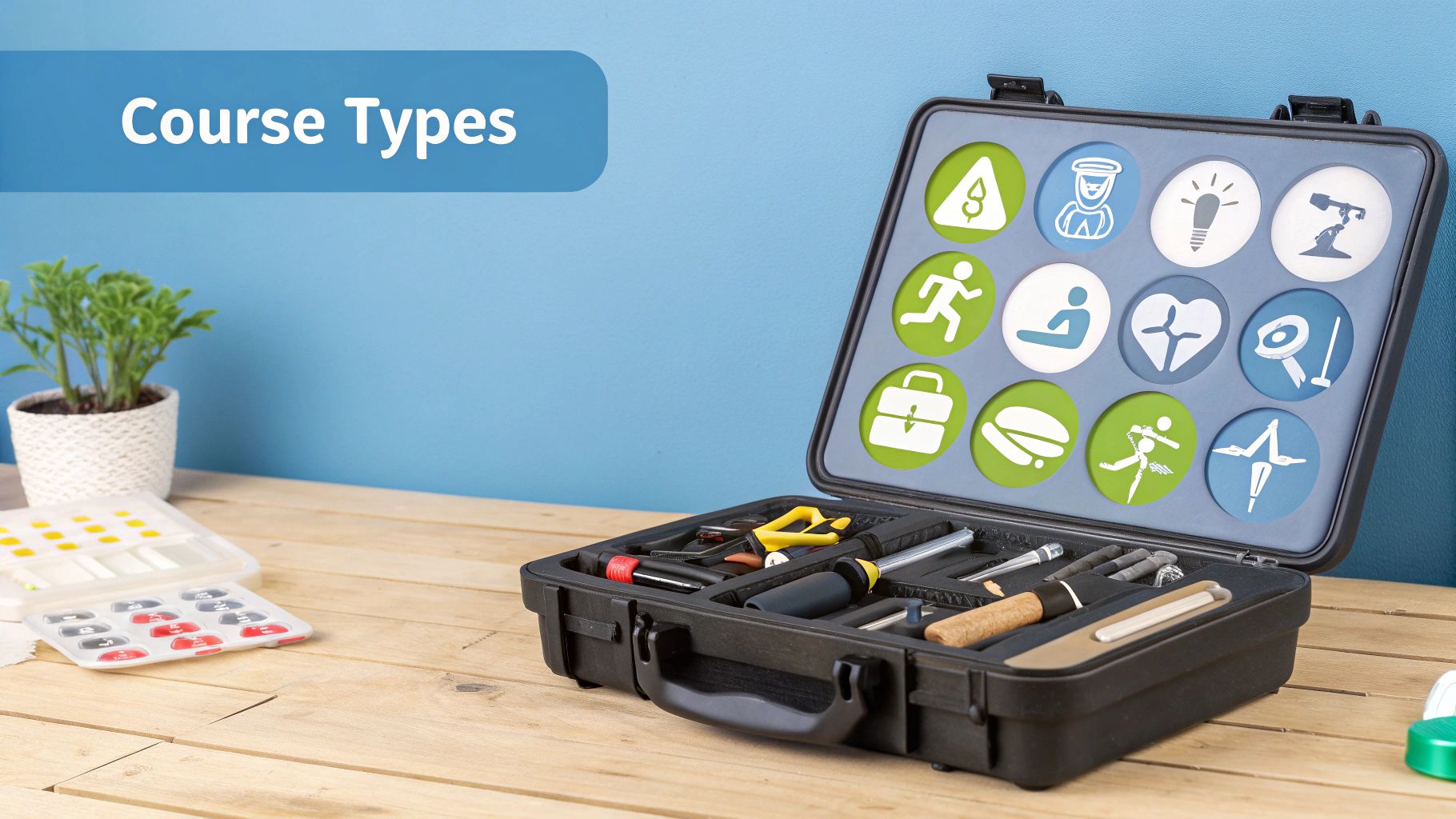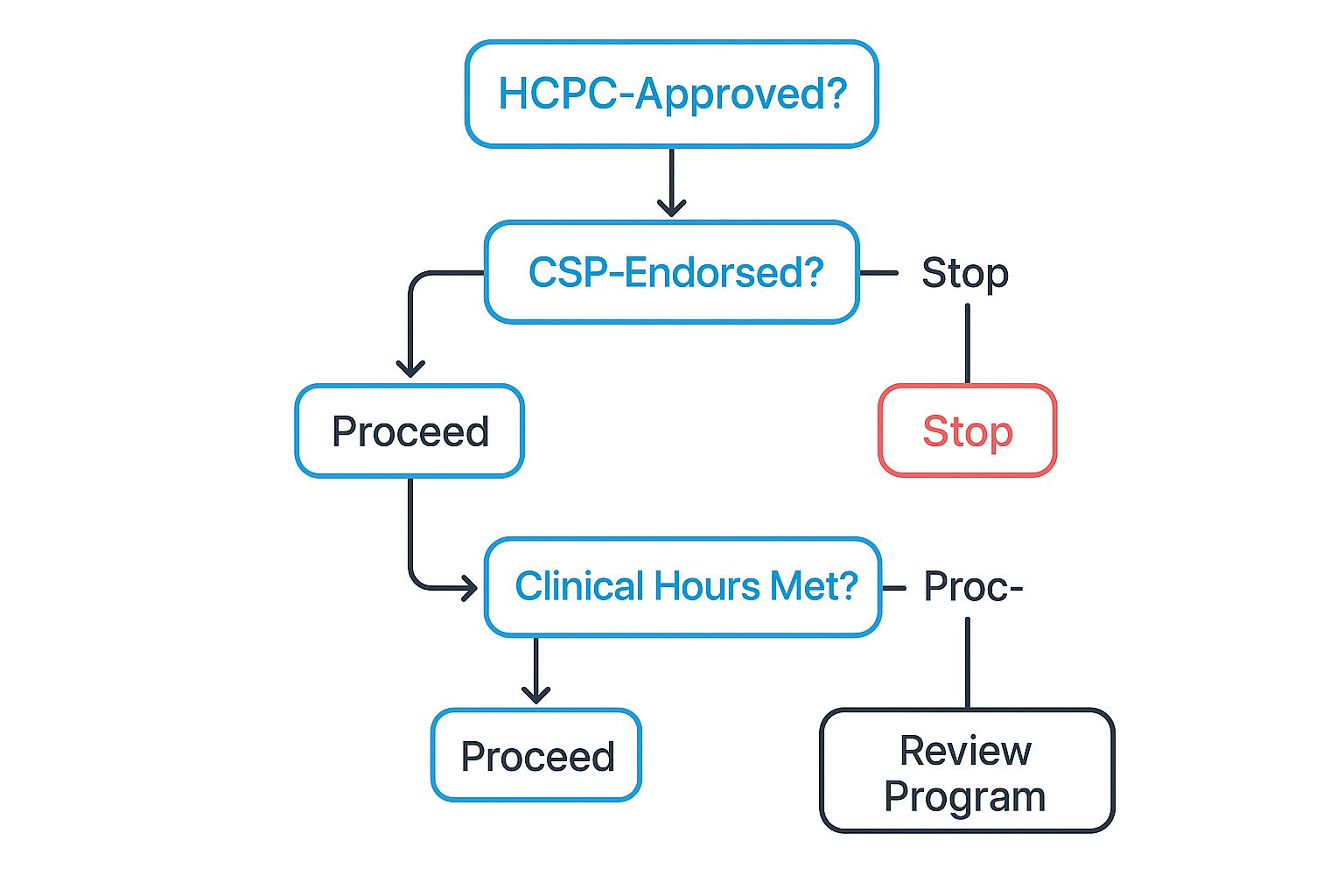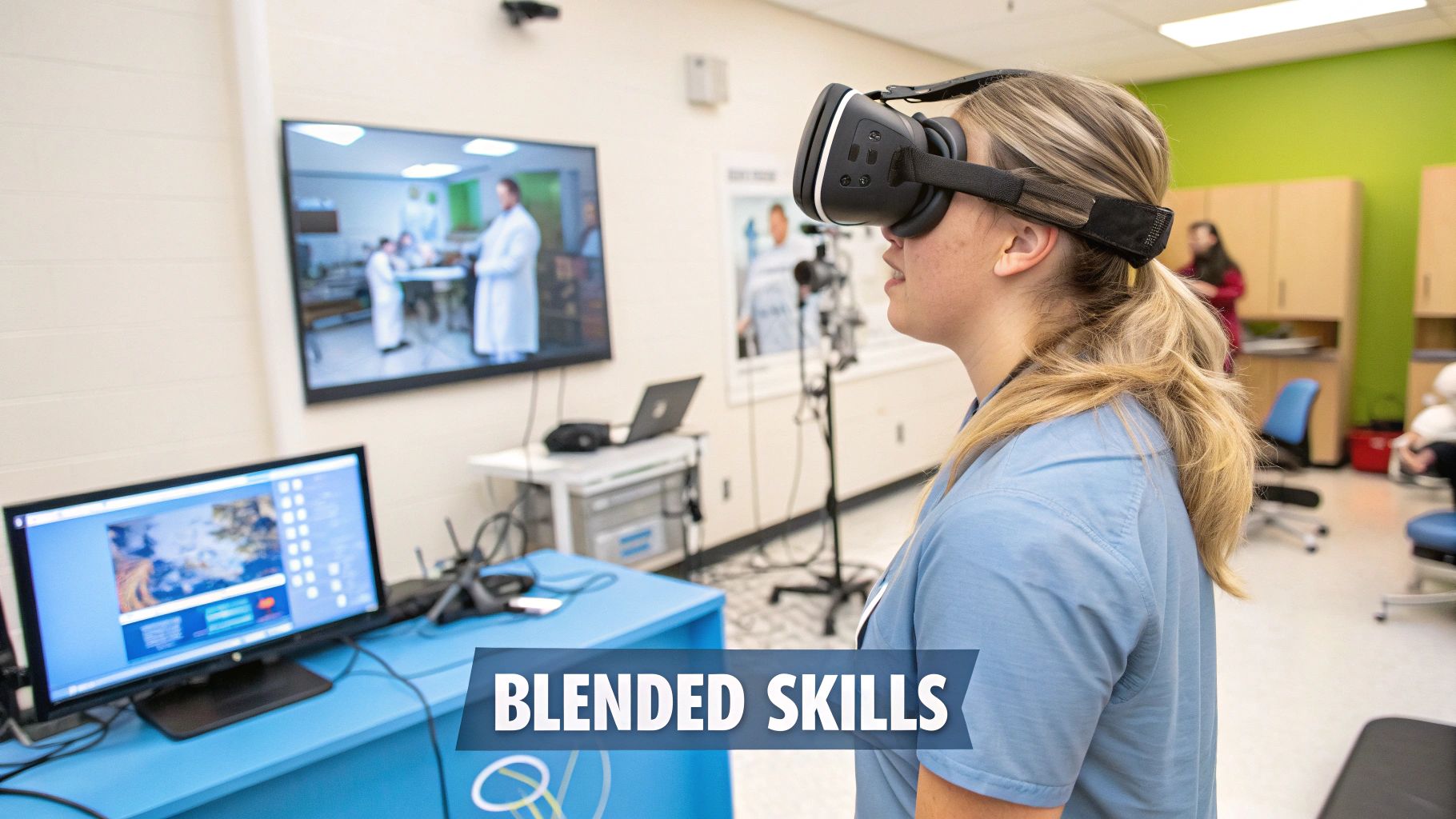Online physiotherapy courses are becoming a popular and genuinely flexible way for people to get qualified, whether you're just starting out or already working in the field. They cleverly mix digital learning with the crucial in-person clinical practice, making it a legitimate route to advance your career in the UK without having to press pause on your life.
The Shift to Digital Learning in Physiotherapy

Think about a dedicated physiotherapist, working full-time in an NHS trust, who dreams of specialising in sports rehabilitation. In the past, this would have meant a tough choice: take a career break and head back to a university campus full-time. Today, online courses for physiotherapy have completely changed the game, offering a much more practical way forward.
This move toward digital learning isn’t just a trend; it’s a response to a real need for more flexibility in professional development. Today’s learners, whether they’re just beginning their journey or are established clinicians, need education that fits around their existing lives and commitments. This is exactly where blended learning comes in.
What Is Blended Learning?
Blended learning is simply a powerful combination of online theory and mandatory, hands-on clinical practice. It’s not about learning to be a physio from behind a screen. It’s about using technology to deliver the academic side of things—like anatomy, physiology, and evidence-based practice—more efficiently.
The essential hands-on skills are still built in real-world settings like hospitals and clinics. It really is the best of both worlds.
This hybrid approach is gaining serious traction across UK higher education. In fact, data from the National Student Survey (NSS) shows a growing preference for programmes that include digital elements. For example, the University of Leicester’s Physiotherapy BSc, which mixes online lectures with virtual seminars, ranked 6th in the UK for 'overall positivity' among similar subjects. This tells us that online components are genuinely improving student satisfaction and results.
Key Advantages of Blended Physiotherapy Learning
The benefits of this modern approach are clear, offering practical advantages for students at every stage of their career. The flexibility is a huge draw, and understanding how to navigate an access course from home can be a brilliant first step for many aspiring physios.
Here’s a quick look at why this model works so well:
| Key Advantages of Blended Physiotherapy Learning |
| :--- | :--- |
| Benefit | Description for Students and Professionals |
| Study Flexibility | Fit your academic studies around your job, family, and other life commitments. |
| Paced Learning | Master complex theories at your own speed, re-watching lectures as needed. |
| Real-World Ready | Apply theoretical knowledge directly during your essential in-person placements. |
| Accessibility | Open up career progression to those who can't relocate or stop working. |
| Enhanced Engagement | Interactive online tools and virtual seminars often lead to a richer learning experience. |
Ultimately, this blended structure respects the demands of a hands-on profession while providing the accessibility that modern learners need.
The core idea behind blended learning in physiotherapy is not to replace practical training, but to enhance it. It allows learners to master complex theories at their own pace, so they are better prepared to apply that knowledge during their crucial in-person placements.
It’s all about creating a more efficient, engaging, and adaptable educational experience that truly prepares you for the realities of clinical practice.
Decoding the Types of Online Physio Courses

Jumping into the world of online courses for physiotherapy can feel a bit overwhelming at first. It's like looking at a massive toolbox without knowing which tool is right for the job you need to do. Every course is built for a specific purpose, designed for different stages of a physio’s career and ambitions.
The first step to building your future is figuring out these differences. Digital physiotherapy education isn't a one-size-fits-all deal. It's a whole collection of pathways, from foundational degrees for newcomers to highly specialised training for seasoned pros. Let's break down the main categories to see which one fits your personal journey.
Foundational Degrees to Start Your Career
If you're starting from scratch, a foundational degree is your essential first step. Think of these programmes as your gateway to becoming a registered physiotherapist in the UK. They are carefully designed as blended learning experiences, mixing tough online academic work with the absolutely essential in-person clinical placements needed for professional registration.
You've got two main routes at this level:
- Bachelor of Science (BSc) in Physiotherapy: This is the traditional undergraduate route, which usually takes three years. It gives you all the comprehensive knowledge and practical skills you need to get started in practice.
- Pre-registration Master of Science (MSc): This is a faster, two-year programme for people who already have a relevant undergraduate degree in something like sports science or human biology. It builds on what you already know to get you qualified more quickly.
Both pathways will have you diving into core subjects like anatomy, physiology, and biomechanics through virtual lectures and interactive simulations. All that theory then gets put into practice during extensive clinical placements, making sure you’re completely ready for real-world patient care.
Advanced Programmes for Specialisation
Once you’re a qualified and practising physiotherapist, the learning definitely doesn't stop. This is where advanced programmes come in, acting as specialised tools to sharpen your expertise in a particular area of practice. These courses are almost always designed for working professionals, offering the flexibility you need to juggle studying with a busy clinic schedule.
Think of it as upgrading your standard toolkit with some high-precision instruments. An advanced Master's (MSc) or postgraduate diploma lets you carve out a niche for yourself, making you the go-to expert.
These specialised programmes empower you to move beyond general practice and become a leader in a specific field. They are your route to tackling more complex cases, taking on senior roles, and contributing to the advancement of patient care in your chosen area.
Some of the most common specialisations you can study online or through blended learning include:
- Musculoskeletal Physiotherapy
- Sports and Exercise Physiotherapy
- Neurological Rehabilitation
- Cardiorespiratory Physiotherapy
- Paediatrics
These programmes go deep into evidence-based practice and advanced assessment techniques, giving you the skills to truly excel.
Doctoral and CPD Pathways for Mastery
Right at the top of physiotherapy education, you'll find doctoral programmes and Continuing Professional Development (CPD) courses. These pathways are for professionals who want to reach the very pinnacle of clinical practice, research, or academia.
A Doctor of Physical Therapy (DPT) is an advanced clinical doctorate that builds on master's-level knowledge, focusing on high-level clinical reasoning and leadership. These are often blended programmes that allow experienced physios to reach the highest standard of practice.
On the other hand, CPD and Short Courses offer targeted, bite-sized learning. They're perfect for mastering a specific skill, like Kinesio taping, advanced manual therapy techniques, or strength and conditioning. These are the most flexible online courses for physiotherapy, letting you add a new skill to your toolkit in just a few weeks or even days, keeping your practice modern and effective.
Navigating UK Accreditation and Professional Standards
When you're looking at online courses for physiotherapy, there's one question that trumps all others: "Is this qualification legit?" In the UK healthcare world, accreditation isn't just a nice-to-have; it's the seal of approval that decides whether your degree launches your career or just becomes a very expensive piece of paper.
Think of it as a guarantee. Accreditation confirms that a course, even one with a lot of online learning, meets the strict national standards needed for safe and effective patient care. Without it, you simply cannot legally call yourself a physiotherapist in the UK. This is where two key players enter the picture.
The Role of the HCPC and CSP
In UK physiotherapy, you’ll hear two acronyms over and over again: HCPC and CSP. Getting to grips with what they do is your first step in checking if a course is the real deal.
-
The Health and Care Professions Council (HCPC): This is the official UK regulator. To work as a physiotherapist, you must be registered with the HCPC. They set the legal standards for professional skills and behaviour. If a course isn't HCPC-approved, finishing it won't get you on their register. Simple as that.
-
The Chartered Society of Physiotherapy (CSP): The CSP is the professional and educational body for the UK's physios. While HCPC approval is the legal must-have, CSP accreditation is the gold standard. It shows a course doesn't just meet the basic requirements but hits a high benchmark for quality physio education.
For anyone wanting to become a physiotherapist, the bottom line is this: your course must be HCPC-approved. This ensures that even blended learning programmes deliver the tough training and vital hands-on clinical skills needed to practise safely. The infographic below breaks this down into a simple decision-making tool to help you size up potential courses.

This quick visual guide makes the checking process much easier, showing that HCPC approval is the critical first hurdle for any physiotherapy qualification in the UK.
How to Verify a Course Is Legitimate
Checking a course's official status is surprisingly straightforward and should be a non-negotiable part of your research. Don't just take a university's word for it—always check with the official bodies yourself.
Here’s a simple step-by-step guide to confirm everything:
- Check the HCPC Approved Programmes List: The HCPC keeps a definitive, searchable list of every approved course in the UK. Head to their official website and use their search tool to find the university and specific programme you’re interested in.
- Look for CSP Accreditation: Next, visit the Chartered Society of Physiotherapy website. They also have a directory of accredited pre-registration courses. Checking it against the HCPC list gives you extra peace of mind about the programme's quality.
- Contact the University Directly: Don't be afraid to ask the admissions team directly about their HCPC approval and CSP accreditation. They should give you clear, straight answers.
If a course isn’t on the official HCPC register of approved programmes, it will not lead to registration. This is a massive red flag, and you should immediately cross that course off your list.
This strict oversight is what has made flexible, high-quality online learning possible. For example, the University of Bath offers a part-time distance learning MSc in Sports Physiotherapy, which requires applicants to already be HCPC registered with at least two years of clinical experience. This model ensures that even advanced online courses maintain incredibly high standards by building on a solid foundation of professional practice.
It's a smart approach that's becoming more common across UK healthcare education. For those just starting out, it's also worth understanding how online access courses are recognised as a valid first step towards these kinds of degree programmes.
Choosing the Right Online Course for Your Career
With so many course options out there, how do you turn a long list into one confident decision? This is where you shift from just browsing to making a strategic choice that perfectly lines up with your career ambitions. It’s all about asking the right questions to map out your own path forward.
Think of it like designing your own career blueprint. Before you pick the materials (the course), you need a clear plan of what you want to build. This means getting really specific about your goals, where you’re starting from, and what you absolutely need from a programme.
Start with a Personal Career Audit
Before you even think about looking at university websites, the first and most important step is to look inwards. A quick personal audit will give you the clarity you need to filter out the noise and focus only on the courses that truly make sense for you. It’s the foundation for making a smart, informed choice.
Ask yourself these questions:
- What are my current qualifications? Are you coming in with A-levels, an access diploma, or maybe a related degree like sports science? Your starting point will determine whether a BSc or a pre-registration MSc is the right fit.
- What is my ultimate career goal? Do you picture yourself working in a busy NHS trust, specialising in paediatric neurology, leading research, or even opening your own clinic? Having a clear vision makes choosing the right specialisation so much easier.
- How much flexibility do I genuinely need? Be honest with yourself about your work, family, and other commitments. A full-time blended course has very different demands than a part-time distance learning programme built for working professionals.
- What is my budget? Think about tuition fees, travel for placements, and any tech you might need. It’s a good idea to research funding options like student loans, scholarships, or employer sponsorship early on.
Answering these honestly acts like a filter, quickly narrowing down your search for online courses for physiotherapy to a much more manageable list.
Aligning Courses with Your Professional Goals
Once you have your personal blueprint sorted, you can start matching your ambitions to specific types of courses. Different career paths need different educational tools, after all. A physio who wants to work with elite athletes has very different training needs than someone aiming to lead a research team.
The table below is a handy guide to help you see how common career goals line up with the most suitable online or blended courses, giving you a clear idea of where each qualification can take you.
Matching Online Physiotherapy Courses to Your Career Ambitions
This table helps you connect the dots between your professional goals and the type of online physiotherapy programme that can get you there.
| Career Goal | Recommended Online Course Type | Typical Entry Requirements | Key Learning Focus |
|---|---|---|---|
| Become a registered physiotherapist | BSc or Pre-registration MSc | A-levels, Access Diploma, or relevant BSc | Core clinical skills, anatomy, patient assessment, and 1,000+ hours of placement |
| Specialise in sports rehabilitation | Advanced MSc in Sports Physiotherapy | HCPC registration and clinical experience | Biomechanics, injury prevention, advanced treatment modalities for athletes |
| Work with children | Advanced MSc in Paediatric Physiotherapy | HCPC registration and clinical experience | Developmental milestones, neurological conditions, family-centred care |
| Lead a clinical research team | Doctorate (DPT or PhD) | Relevant MSc and significant experience | Advanced research methods, data analysis, contributing original knowledge |
| Enhance a specific clinical skill | CPD Short Course (e.g., Kinesio Taping) | HCPC registration | Practical application of a single, targeted technique or modality |
As you can see, choosing the right course isn’t about finding the "best" one overall, but the one that is the best fit for your specific destination.
Your choice of an online physiotherapy course is one of the most significant investments you'll make in your professional life. It's not just about earning a qualification; it's about selecting the right key to unlock the specific career door you want to walk through.
For example, imagine a newly qualified physio who discovers a real passion for helping stroke survivors. They might look for a part-time MSc in Neurological Rehabilitation. This would let them keep working while building the specialist knowledge needed to become an expert in that field. Their choice is driven entirely by their career goal, showing that your education should always follow your ambition, not the other way around.
How Blended Learning Builds Hands-On Skills

This is usually the first question on everyone's mind: how on earth can you learn such a hands-on profession through a computer screen? It’s a completely fair question, but the reality of modern physiotherapy training is far more advanced than just watching online lectures. The secret ingredient is a carefully designed approach called the ‘blended learning’ model.
This model doesn't try to replace practical skills with digital ones. Instead, it uses technology to perfect all the theoretical knowledge, which frees up your valuable in-person time for what really counts: mastering your clinical skills.
Bridging Theory and Practice
Think of it like learning to fly a plane. You wouldn't expect a trainee to just hop into a real cockpit without first spending dozens of hours in a high-tech flight simulator. That simulator provides a safe, controlled space to master the complex principles of flight, navigation, and what to do in an emergency. You can make mistakes, repeat tricky scenarios, and build up your foundational knowledge without any real-world risk.
Online physiotherapy modules work in a very similar way. You could call them the ‘flight simulator for physios’.
These digital learning environments let you dive deep into complex subjects like anatomy, biomechanics, and pathology, all at your own pace. This is made possible by some seriously impressive tools, including:
- Virtual Reality (VR) Anatomy Labs: Imagine exploring the human body in 3D, able to manipulate muscles and joints in a way a textbook could never show you.
- Advanced Patient Simulations: These are interactive case studies that challenge your diagnostic skills and clinical thinking in a completely risk-free setting.
- Live-Streamed Practical Demonstrations: You can watch expert tutors showcase specific techniques, with the ability to rewind and analyse them as many times as you need.
All this digital preparation means that when you finally step into a real clinic for your placements, you’re not starting from zero. You arrive with a solid theoretical foundation, ready to focus on putting that knowledge into practice and perfecting your hands-on techniques with real patients, all under expert supervision.
The Cornerstone of Clinical Placements
The hands-on part of any accredited physiotherapy course is completely non-negotiable. UK regulations are incredibly strict, requiring every student to complete a minimum of 1,000 hours of supervised clinical practice before they can qualify for HCPC registration. This is where the blended learning model comes to life—where theory truly meets reality.
These placements are organised by the university and happen in a variety of real-world healthcare settings.
Your clinical placements are where all the online learning crystallises into professional competence. It's the transition from knowing what to do, to knowing how and why to do it with a real person in front of you.
You’ll gain invaluable experience in diverse environments such as:
- Large NHS trusts
- Specialist private clinics
- Community health centres
- Sports rehabilitation facilities
During these placements, you’ll be assessed by experienced clinical educators who guide your development and make sure you meet the high standards required to practise. More and more institutions are adopting this hybrid model because it’s proven to be so effective. The Robert Gordon University, for instance, offers a Doctorate in Physiotherapy that successfully blends online academic study with these vital hands-on placements, showing just how much confidence there is in this approach.
This integrated system ensures that graduates from blended online courses for physiotherapy are every bit as skilled, competent, and employable as those from traditional, campus-based programmes. If this sounds like the right path for you, an Access to Higher Education Diploma in Sport Science can be a brilliant first step to meeting the entry requirements for these degrees.
Your Questions About Online Physiotherapy Courses Answered
Thinking about starting a physiotherapy course online is exciting, but it’s natural to have a few questions. When you're mapping out your future career, you need clear, straightforward answers to feel confident about taking the next step. We’ve pulled together the most common queries to clear up any confusion and help you move forward.
The biggest question that comes up, time and again, is about the hands-on training. It’s a perfectly valid concern for a profession that’s all about physical interaction. Let’s tackle that, and a few other key points, head-on.
Can I Become a Qualified Physiotherapist Entirely Online?
In short, no. It’s impossible to qualify as a physiotherapist in the UK through a course that is 100% online. Every single accredited UK physiotherapy degree that leads to professional registration uses what’s known as a ‘blended’ learning model.
This format is a specific mix of online academic study and absolutely essential, in-person clinical placements. These placements are where you'll build the non-negotiable, hands-on skills needed for safe and effective patient care. In fact, completing over 1,000 hours of this practical training is a mandatory part of your qualification.
Are Online Physiotherapy Degrees Valued by Employers?
Yes, completely. Employers, including the NHS, hold degrees from accredited blended learning programmes in the exact same high regard as those from traditional, campus-based courses. The detail that truly matters is the accreditation, not how the theory was delivered.
If a physiotherapy degree is approved by the Health and Care Professions Council (HCPC), it’s a guarantee that the programme has met strict national standards for both theoretical knowledge and practical competence. Graduates are fully equipped and eligible for roles across the entire healthcare sector, both public and private.
Think of accreditation as the ultimate quality mark. For an employer, an HCPC-approved degree means you have completed a rigorous, comprehensive education and are ready for clinical practice—regardless of whether some of your theory was learned online.
What Technology Will I Need for My Course?
You can breathe a sigh of relief – you won't need to build a high-tech lab in your living room. The requirements are generally pretty straightforward and accessible for most students.
Typically, you'll need:
- A reliable, modern computer or laptop.
- A stable, high-speed internet connection.
- A working webcam and microphone for any interactive sessions.
Universities deliver their online material through web-based platforms called Virtual Learning Environments (VLEs). If any specialised software, like for simulations, is needed, the university will give you clear instructions and often includes access as part of your tuition fees.
How Are Students Assessed in a Blended Format?
Assessment is a two-pronged approach designed to test every aspect of your learning journey. Your theoretical knowledge is evaluated through a variety of online methods, including digital exams, written essays, video presentations, and detailed case study analyses.
Then, your practical skills are assessed during your in-person clinical placements. Here, qualified clinical educators will observe, guide, and formally evaluate your performance as you work with real patients in real healthcare settings. This dual approach ensures you are fully competent in both the science and the art of physiotherapy.
At Access Courses Online, we provide accredited online Access to Higher Education Diplomas that serve as the perfect first step toward your university degree in the health professions. If you're ready to start your journey, explore our courses and see where they could take you.

